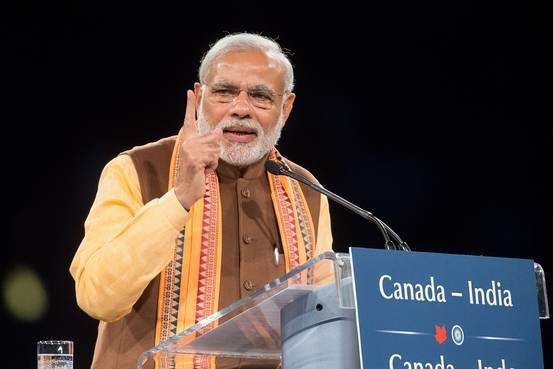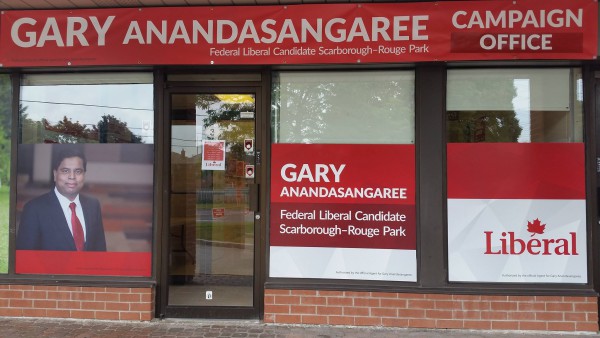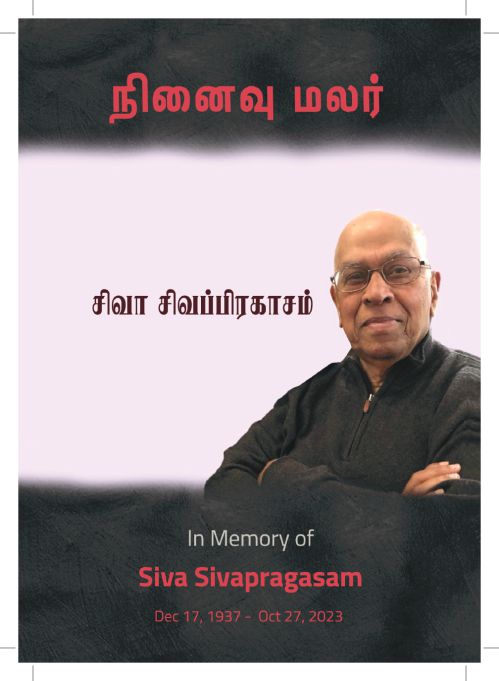OP-ED
Invasion of oil into the ground water threatening the Livelihood and Health of people in Jaffna peninsula
By Siva Ganeshalingam
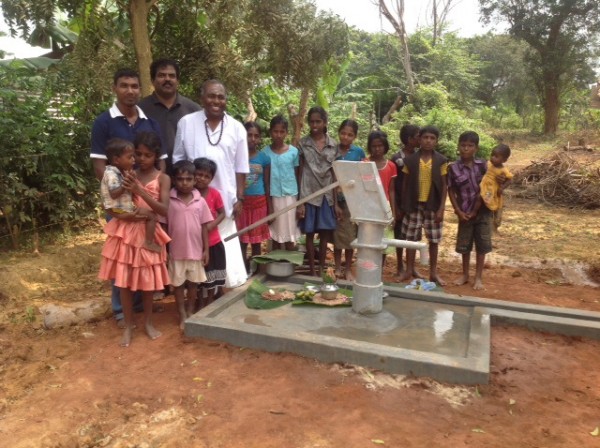
A family near a new Tube well
The failure of parliamentary politics and the entrenchment of ethnic politics led to many years of civil war in Sri Lanka. The devastating war had a toll on the psyche and sanity of Tamils living in the war torn area. When the war ended in 2009, people expected to see the light at the end of the long, dark and arduous tunnel they travelled for so long. But the darkness still seems to prevail, saddling the people with a different kind of problem with life threatening implications.
While Mullivaikal massacre of innocent civilians towards the end of the war is still fresh in our minds and when people are getting used to a semblance of somewhat normal life, another calamity is taking shape, prolonging the suffering, with the potential to affect our people for generations. The quick death of thousands of our people, caused by the war, is going to be replaced by the impending slow death due to oil pollution of the ground water in the Valikamam sector of the Jaffna peninsula. Currently, pollution affected only a small area of about 10 miles radius. Considering the rate at which the oil plume is moving in the underground aquifer, the local experts believe (according to a recent article published in one of the local newspaper by Dr. Kannathasan, medical faculty lecturer, University of Jaffna) that it will eventually migrate to pollute the ground water in substantial part of the peninsula.
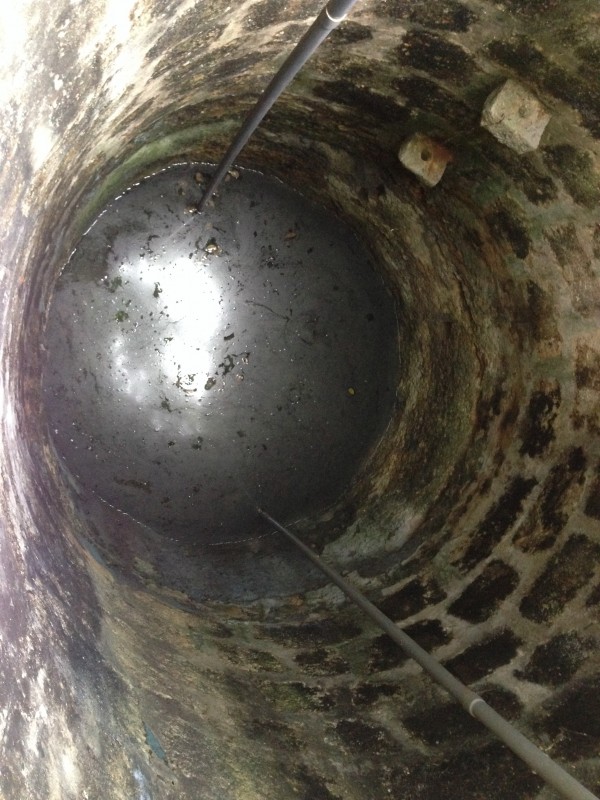
A typical well in Jaffna
Water is an essential component of life. Our survival depends on it. It is a well-known fact that you could live without food for a month but you would be dead after a week without water. United Nations resolution 64/292 clearly stipulates that it is the duty of every country to give its citizens access to safe and affordable drinking water. It is an inalienable right of every human being.
In certain areas of the Jaffna peninsula, closer to the coast, sea water already intruded into the ground water supply. Salt water mixing with ground water is understandable. But oil mixing with ground water is unacceptable. As engineers, we were taught how to extract oil from the soil but not to transfer oil back to the soil.
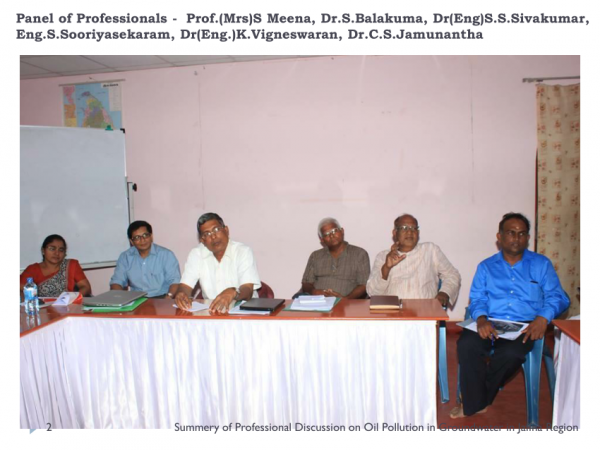
The current oil pollution detected in the Valikamam area is believed to have been originated from Chunnakam power station. The reason for the quick spread of pollution affecting the towns and villages is not yet clear. We are still waiting for a consistent and convincing explanation from the authorities. Government, as usual is very economical with the truth as to how all the waste oil accumulated over many years in ponds, in the vicinity of the power station, suddenly ended up in the largest aquifer in the Jaffna peninsula. Community leaders and local politicians (except a few) don???t seem to understand the seriousness of the problem that is bound to affect our community for generations. Their response to the queries of people, concerned about the pollution, appeared to be more reticent than receptive.
Northern Power, a Malaysian based company who operated the power station under contract with the Ceylon Electricity Board (CEB) had been identified as the main culprit. It is during their watch, oil started spreading to a larger area through the underground aquifer. Our people in the affected area are exasperated by the paralytic incompetence and questionable work ethics of Northern Power. Unprecedented abdication of responsibility by the CEB authorities, supposed to have supervised the contractor, and by extension, the central government, is not a scenario expected in any decent democratic system. As it is now, it is no more a cause for concern. It is a cause for alarm. Immeasurable and probably irredeemable harm is already being done ??? a man-made catastrophe which is going to be pretty difficult to rectify.
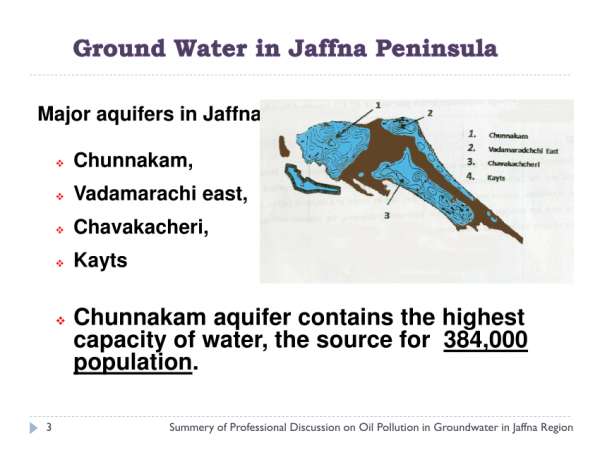
I am at a loss as to why this matter, which is bound to cause seismic changes to the fabric of our society in Jaffna, is not reported in most of the vast array of Tamil newspapers published in Toronto. I don???t think, Tamils in Canada are aware of the seriousness of the problem and how it is going to lead to an ecological disaster, drastically affecting the daily lives of people in that area. It is the sacred duty of our Tamil media to bring this to the open for the Canadian Tamils, comfortably settled in this peaceful country, to understand and assimilate what out kith and kin are going through in Jaffna.
As a Chemical Engineer by profession, I have a pretty good idea about the eventual ecological disaster this is going to cause to the prime farm lands in that area as well as the detrimental health problems that are going to affect, not only the people living there now, but also the future generation not yet born. Birth defects caused by the use of oil contaminated water are a serious health concern.
Let me share my thoughts with the local Tamil community for us to collectively make an attempt to bend the history???s arc in the direction of justice to Tamil people. We in the diaspora have a moral obligation, not only to extend empathy for our people there, but also to contribute with adequate energy and emphasis, doing everything possible, to stimulate remedial actions to alleviate this unfortunate problem.
Let me break the analysis of this pollution problem into 4 different headings.
1. Sources
2. Causes of the mess
3. Medical and ecological concerns
4. What we can do
Sources
Unfortunately, we are not blessed with any major rivers or water supply schemes in the Jaffna peninsula. (Before the introduction of the water pumps, it used to be a herculean task to do farming in Jaffna. That is why our people went for education and made generations of Sinhalese politicians jealous of our society???s achievement in the educational field.) We depend on the ground water for drinking, agriculture and other uses. We have a short rainy season and rain is our only source to recharge the limestone aquifer. Jaffna peninsula has 4 main aquifer systems. They are
(a) Valikamam (Chunnakam)
(b) Vadamaradchi
(c) Thenmaradchi
(d) Kayts
The Chunnakam aquifer had the highest capacity with a thick lens of fresh water floating over sea water. The manmade disaster of this rich water resource can spell the doom of this hospitable land that has supported life for centuries.
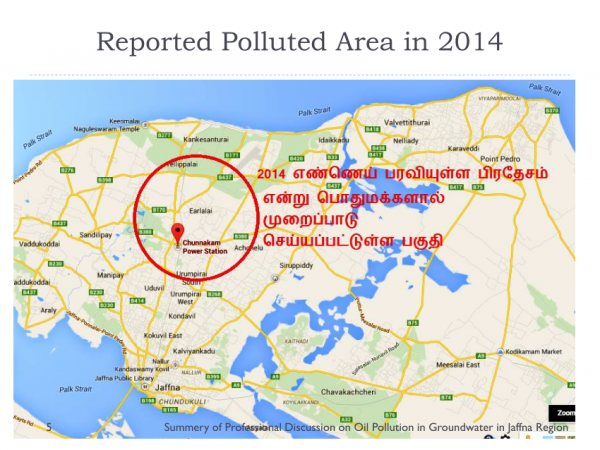
Causes and the timeline of the current mess
It is suspected that the waste lubrication oil used in the generators during the periods when the Jaffna peninsula did not receive power directly from the national grid (Laxapana), was disposed in the depressions in the surrounding land. It is possible that this disposal procedure may have been practiced from the late 1950s by the CEB until 1973 when Jaffna started receiving electric supply from Laxapana, and then more recently during the war years when electric supply from the national grid was cut off.
Northern Power, under contract with CEB set up its electricity generating plant in Chunnakam in 2009. It was a 16 MW plant, later upgraded to 25MW. According to a recent article written by Prof Daya Somasundaram in Colombo Telegraph, Northern Power disposed around 100,000 to 200,000 litres over six year period. During the war years, the power station area was a high security zone, tightly guarded by the military and the public did not know what was going on inside more than 20 acres of land. After over a decade without electricity, people were more than happy to have some irregular supply than asking questions. There were 3 dumping sites which the workers use to call oil kulams (ponds) 1, 2 and 3. The oil from these kulams slowly percolated into the immediate surrounding areas. Alarm was raised by the residents in 2010 about foul smell in their wells. The Chunnakam farmers association wrote a letter to the Jaffna Government Agent (GA), that they were using water polluted with oil. No action was taken. However, the water resource board stopped taking water from the Chunnakam intake site.
Water board authorities in Jaffna, did a thorough investigation including the analysis of wells samples and wrote a report to the government, warning them about the dire ecological consequences of the spreading oil pollution. Their report was ignored and later the manager off the water board was removed from the office. The people eventually decided to go to court to obtain a court order for the Northern Power to open the premises for the local scientists and the public to see what is happening inside. If they had left the oil still in the Kulams, the damage would have been minimal and the remediation process less expensive. But for reasons that cannot be explained, Nothern Power, according to some reliable sources, drilled bore holes through those kulams, pushing the oil into the largest aquifer in Jaffna. Once it reached the lime stone aquifer it quickly mixed with the flowing water spreading the contamination to a very large area within a short time. As far as I know it has spread north up to Tellipalai, south up to Urumpirai, East up to Neerveli and west up to Chankanai. I am not sure whether it is a panicky measure with hubristic errors of judgement by the northern Power or a deliberate action with diabolical intentions. Either way it is an unpardonable crime against humanity.
Medical and Ecological concerns
Long term exposure of the contamination is known to cause cancer, miscarriages and detriment to Early Childhood Development, babies born with birth defects, skin diseases, kidney problems and mental health. I heard some villagers in Jaffna are saying that they can pour out the oil layer which usually floats at the top and use the rest for drinking and cooking. Although hydrocarbons are generally not very soluble in water, there is always a certain amount dissolved in water, the quantity depend on the type of hydrocarbon. The solubility of polyaromatic hydrocarbons such as phenanthrene, anthracene and pyrene is very low but they are carcinogenic even in very small amounts. The solubility of other lighter hydrocarbons is higher. You cannot remove all the oil by simple decantation or gravity settling process. What people have to understand is that drinking oil contaminated water is not going to kill a person immediately. The oil gets deposited in the fat cells of the body and may stay dormant for a long time. But when the person gets sick with some other ailments and cannot eat any food for a couple of days (or go through days of fasting as Hindus usually do), the body will be compelled to use its fat cells to produce energy. That is where the problem will start. A simple flu could eventually lead to serious ailments such as cancer. The detrimental effect of oil pollution in the body is cumulative and it takes time for the ugly tentacles of the disease to strangle the person.
Ecological problems and the effect of oil pollution on the livelihood of people in the villages are difficult to assess at this point. We can only keep our fingers crossed with the fervent hope that the whole affected area is not going to turn out to be a desert where nothing will grow.
What we can do
Remediation of contaminated groundwater involves lengthy and costly legal battle and it will take 5 to 10 years or more before the contaminant levels are reduced to portable quality. Pointing accusing fingers at the suspected perpetrators of this man-made disaster is not going to solve our problem. Our new government in Sri Lanka, whose treasury had been emptied by the previous regime, is not going to be helpful either. At this point we have no alternative except to choose pragmatism over retribution and make every effort to support our people in this wrenching moment to turn their desperation into hope.
(a) Propaganda campaign
The problem, as I understand is not going to be easy to rectify. The migration of the oil has to be stopped. Cleaning up the underground aquifer system is going to be hugely expensive. We need international help. We in the diaspora have to start a propaganda campaign to let the western countries know the plight of our people and the lack of commitment on the part of Sri Lankan government to combat its root causes. We have to coordinate with Tamils in the other western countries especially with those in the USA who are much more active than us.
(b) Educate our people about health hazards
We have to educate our people that decanting the polluted water and removing the surface layer of oil will not make the water suitable for consumption. The cumulative effect of accumulated hydrocarbons in the body might manifest as a serious disease in the long run.
(C) Saving rain water
Our current unfortunate predicament is not due to the lack of visionaries to predict the future problems of groundwater supply. Prof Thurairajah, the late vice Chancellor of the university, a man of vast experience and sweeping insights, prophetically pointed out that Jaffna peninsula is going to run out of ground water because of the heavy use for agricultural purposes. He suggested that everything possible should be done to save rain water during our short rainy season by activating ponds and tanks to hold rain water. Although, he is no more with us, he left a mark that doesn???t need any embellishment. His spirit is still hovering around through the numerous students he nurtured and trained over the years, who are holding enviable executive scientific positions all over the globe. They are the ones who voluntarily took the leading roles to spearhead the diaspora effort to help our people at home.
The other visionary, who is still very active, is Thondunathan. He is a virtuous person with saintly qualities (that is why all of us call him Swami Thondunathan), a devoted disciple and ardent follower of Yogar swamigal. His tireless dedication and optimistic vision enriched everyone he worked with. He led by example to renovate the ponds and tanks in the North and east to preserve rain water and at the same time urging local and diaspora communities to contribute with passionate commitment to do the same. We have to help him by all means available to us for him to be successful in this noble cause
Provide financial and technical support
Two things they urgently need are suitable analytical equipment to assess the level of contamination and some cheap devices or suggestions to remove oil for them to get at least small quantities of drinking water. Hydrocarbon analytical equipment to analyze ppm levels is expensive. A group of Tamils in USA contributed money to purchase sophisticated analytical equipment for about $15,000. I believe they have already sent it to Jaffna. We have to get more for them to have enough to serve the whole area for periodic checking of contaminant of numerous wells in many villages.
Support the Faculty of Engineering
The Engineering Faculty of University of Jaffna is relatively new and a few dedicated individuals like the Dean of Engineering Dr Atputharajah and the Head of Civil Engineering department Dr Sivakumar are trying their best to keep it afloat. Our extensive pool of scientists and engineers in the diaspora should join together to collectively offer our support in terms of advice and also to acquire appropriate, state of the art equipment, for the Engineering laboratories. Atputharajah indicated in his recent email to Gnana Chinniah in USA that the university will support any professor from our diaspora, in terms of accommodation and other expenses, to work in their faculty for up to three months to develop a laboratory on his or her expert area.
I hope some of our eminent professors willingly take up the challenge to spend part of their sabbatical there.
Justice and compensation
If sabotage is suspected in polluting the drinking water supply, the perpetrators must be taken to court and the affected people have to be compensated for the losses and risks they have been exposed. We should make every effort to fight for justice for our people through western countries and international organizations.
Recent conflicting signals from Jaffna confuse our scientific community in the diaspora, already working hard to find viable and lasting solutions to this serious problem. At this point our focus should be on what we can do instead of whom to blame. For us to effectively contribute, politicians, scientists and medical personnel in the field in Jaffna should accept that there is a problem. It is very difficult for us to belief that 200,000 litres of oil sent into the underground aquifer disappeared like magic without any remediation effort. We are wondering whether it is a political ploy to downplay the issue. This is something that is not going to affect the health of people immediately. But the long term effect could be disastrous. I don???t think anybody should play games with the health of our future generation focussing squarely on short term conveniences without considering long term consequences.
It is possible that oil may have got stuck in the lime stone aquifer. During the dry season, when the water level in the aquifer is low, oil tends to get attached to the solid surface in the aquifer. But the attached oil layers are bound to detach and flow with groundwater during the rainy season. So gloating over low levels of oil detected in some wells samples as reported recently in Jaffna news media (if it is true) is certainly premature.
Let me conclude by insisting that when we encounter setbacks, we don???t have to throw in the towel. We should redouble our resolve to bring it to the open the ever resilient Tamil spirit to solve the challenges with creativity and optimism.
————————————————————————————————
Siva Ganeshalingam, Chartered Engineer, UK is a member of the Institution of Chemical Engineers (MIChemE), UK and currently Senior Laboratory Instructor, Chemical Engineering Department, University of Waterloo, Ontario. His extensive experience includes research analysis of organic compounds, including polyaromatic hydrocarbons, using Gas Chromatograph (GC) and High Pressure Liquid Chromatograph (HPLC) and also in bio-remediation of petroleum contaminated soils.






